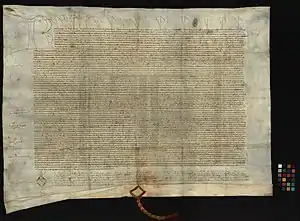Treaty of Windsor (1386)
The Treaty of Windsor was a diplomatic alliance signed between Portugal and England on May 9, 1386, in Windsor and sealed by the marriage of King John I of Portugal (House of Aviz) to Philippa of Lancaster, daughter of John of Gaunt, 1st Duke of Lancaster.[1] With the victory at the Battle of Aljubarrota, assisted by English archers, John I was recognised as the undisputed King of Portugal, putting an end to the interregnum of the 1383–1385 Crisis.[1] The Treaty of Windsor established a pact of mutual support between the countries.[1]
| Treaty of peace, friendship and confederation between John I of Portugal and Richard II, King of England | |
|---|---|
 Treaty of Windsor | |
| Drafted | 9 May 1386 |
| Signed | 24 February 1387 |
| Location | Westminster |
| Negotiators |
|
| Signatories | |
| Ratifiers | |
| Depositary | Portuguese National Archives |
| Language | Latin |

This document is preserved at the Portuguese National Archives.[2]
Historian Matthew Winslett says, "This treaty has been the cornerstone of both nations' relations with each other ever since."[3]
Enduring to this day, the Treaty of Windsor holds the record as the longest-lasting diplomatic treaty in recorded history.[4]
See also
References
- Livermore, H.V (1947). A History of Portugal. Cambridge University Press. p. 179. Retrieved 7 October 2021.
- "Tratado de paz, amizade e confederação entre D. João I e Eduardo II, rei de Inglaterra, denominado Tratado de Windsor" (9 May 1386) [textual record]. Arquivo Nacional Torre do Tombo, ID: PT/TT/GAV/18/3/25. Direção-Geral do Livro, dos Arquivos e das Bibliotecas (DGLAB). Retrieved 7 October 2021.
- Winslett, Matthew (August 2008). The Nadir of Alliance: The British Ultimatum of 1890 and Its Place in Anglo-Portuguese Relations, 1147-1945 (PDF) (MA). Supervising Professor: Douglas Richmond. The University of Texas at Arlington. p. 14. Archived from the original on 17 September 2008. Retrieved 7 October 2021.
This treaty has been the cornerstone of both nations' relations with each other ever since. This is particularly true in regards to the Portuguese. The various treaties that follow it build upon the promises made at Windsor and never abrogate its terms, especially in the case of guarantees of territorial defense and military aid.
- BBC History Revealed magazine; May 2023 issue; Page 15
Bibliography
- Country profile of Portugal, Archived 31 July 2003 at the Wayback Machine Foreign, Commonwealth and Development Office website
- Livermore, H.V (1947). A History of Portugal. Cambridge University Press. p. 179. Retrieved 7 October 2021.
- Winslett, Matthew (August 2008). The Nadir of Alliance: The British Ultimatum of 1890 and Its Place in Anglo-Portuguese Relations, 1147–1945 (PDF) (MA). Supervising Professor: Douglas Richmond. The University of Texas at Arlington. p. 14. Archived from the original on 17 September 2008. Retrieved 7 October 2021.